Top Workday Training Institutes in Bengaluru near me
Workday Advanced Studio Course in Bengaluru
Today, we will cover a topic within the Workday Advanced Studio Course in Bengaluru that often arises: handling special characters when processing data.
As anyone familiar with Workday integrations will attest, dealing with unexpected characters can be a frustrating experience.
experiences using Workday Advanced Studio have shown that these special characters appear frequently in employee names, inbound files, and web service requests.
One effective solution is to use Workday’s accessibility code, which offers built-in functions for managing these characters.
With this approach, memorable characters will always be translated correctly before upload.
Workday Advanced Studio’s replace-all function offers an alternative method for cleaning data uploaded via file uploads, and is also suitable for use when dealing with expressions and accessibility settings.
When used within expressions, it provides access to various methods for data cleansing tailored to specific user profiles and needs.
An ASCII conversion may be suitable in certain instances; otherwise, searching Workday’s community accessibility guidelines for more structured replacement methods may be helpful.
With employee IDs, in particular, special character handling should always be integrated before submission to ensure smooth processing and efficient times.
Workday Advanced Studio streamlines integration processes by automating data replacement tasks.
From using accessibility functions, searching for structural codes, or writing custom replace functions, every step contributes to data integrity.
As we further explore Workday Advanced Studio, be sure to test its encoding field to see if it facilitates character conversions more efficiently.
Understanding various solutions, ranging from accessibility replacements to encoding transformations, ensures that our Workday integrations remain smooth and error-free.
Working with Cloud Logs and File Processing in Workday Advanced Studio: Effective log management in Workday Advanced Studio is crucial when handling multiple files simultaneously.
If an integration generates numerous logs for every file, how can we ensure that only the latest file appears in our logs? Workday Advanced Studio enables us to organise logs within integrated events by filtering data to only record completed files, thereby eliminating clutter in logs.
A further method relies on Workday Advanced Studio’s event-driven features for streamlining logs.
Optimising cloud logs can vastly enhance integration efficiency. By setting filters or refining how data gets recorded, optimising them can make a considerable impactful improvement to integration efficiency.
Workday Advanced Studio streamlines processes by efficiently handling log events. For those interested in mastering these capabilities, the Workday Advanced Studio course in Bengaluru provides in-depth knowledge and hands-on experience as we continue to hone my approach and explore event-driven functionalities for optimising cloud log structures.
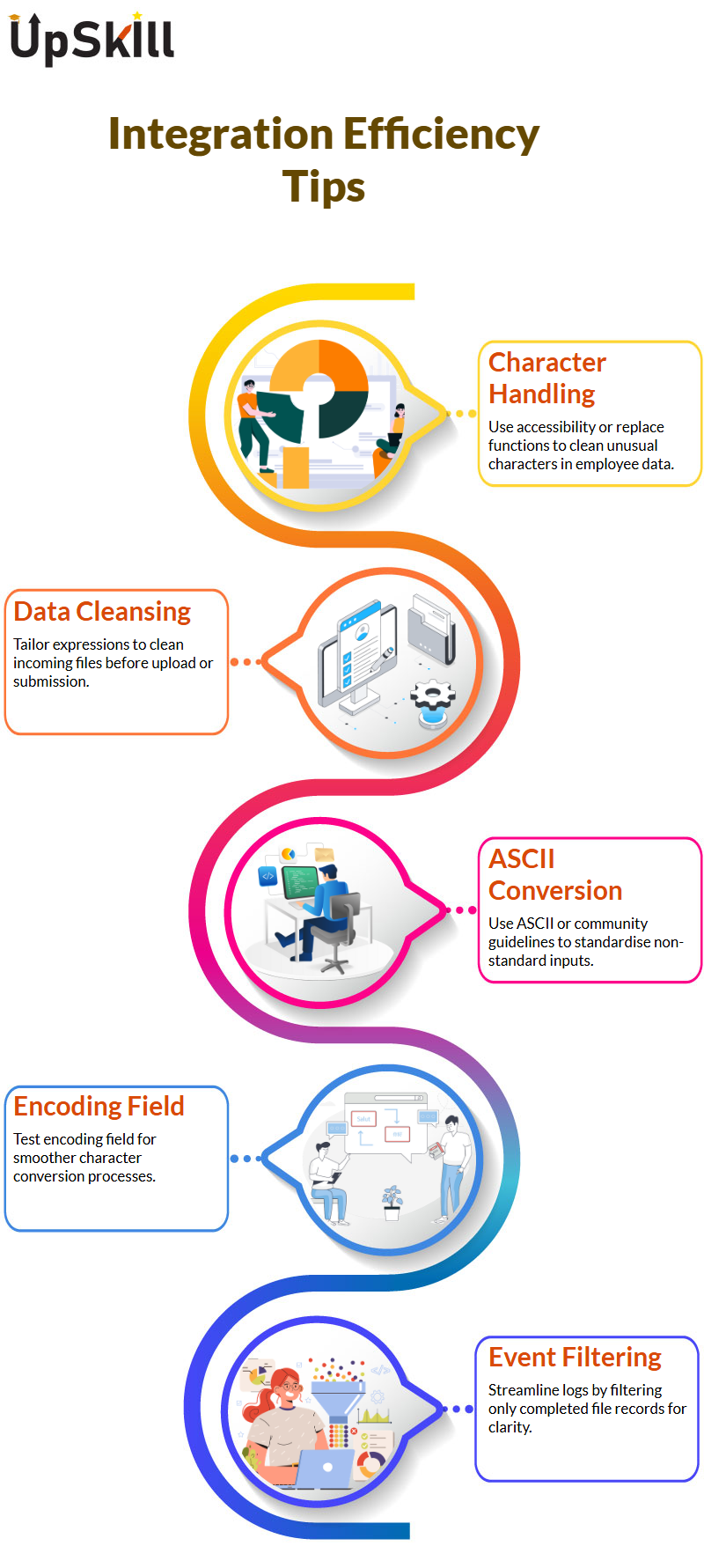
Understanding Workday Advanced Studio
Let’s dive deeper into the Workday Advanced Studio course in Bengaluru to appreciate its incredible power.
Suppose you have multiple files that need to be processed efficiently and require an effective way to monitor progress. In that case, Workday Advanced Studio’s intuitive approach provides the solution by utilising its various components effectively.
Utilising event documents in Workday Advanced Studio, we can determine the total number of files present and identify which ones require processing.
Utilising simple events with checksum verification provides an accurate count of available files.
With Workday Advanced Studio, we can also process them into various workflows within Workday itself for later review and processing if required. Processing Files with Workday Advanced Studio
Workday Advanced Studio enables us to process files sequentially while monitoring the status of completed ones.
By initialising a counter, we can keep track of how many processed files compare to the total available ones; when these numbers align properly, Workday Advanced Studio ensures appropriate storage.
Handling cloud logs or loops within Workday Advanced Studio requires using store components correctly to maintain a timely workflow that ensures only fully processed files are saved for storage. W.A.S: Error Handling in Pending Files (WSAPI 1.0 and later).
Errors may arise while working with web service requests in Workday Advanced Studio. Assume one out of five files encounters an error — how will we manage this effectively? One approach would be using Workday Advanced Studio’s global error handler, which effectively captures any exceptions encountered.
Workday Advanced Studio enables us to use sync mediation as an effective method for handling errors, providing a means to record responses to failed processes and prevent workflow disruptions.
While sync mediation may assist, a global error handler is still considered more reliable due to its robust approach.
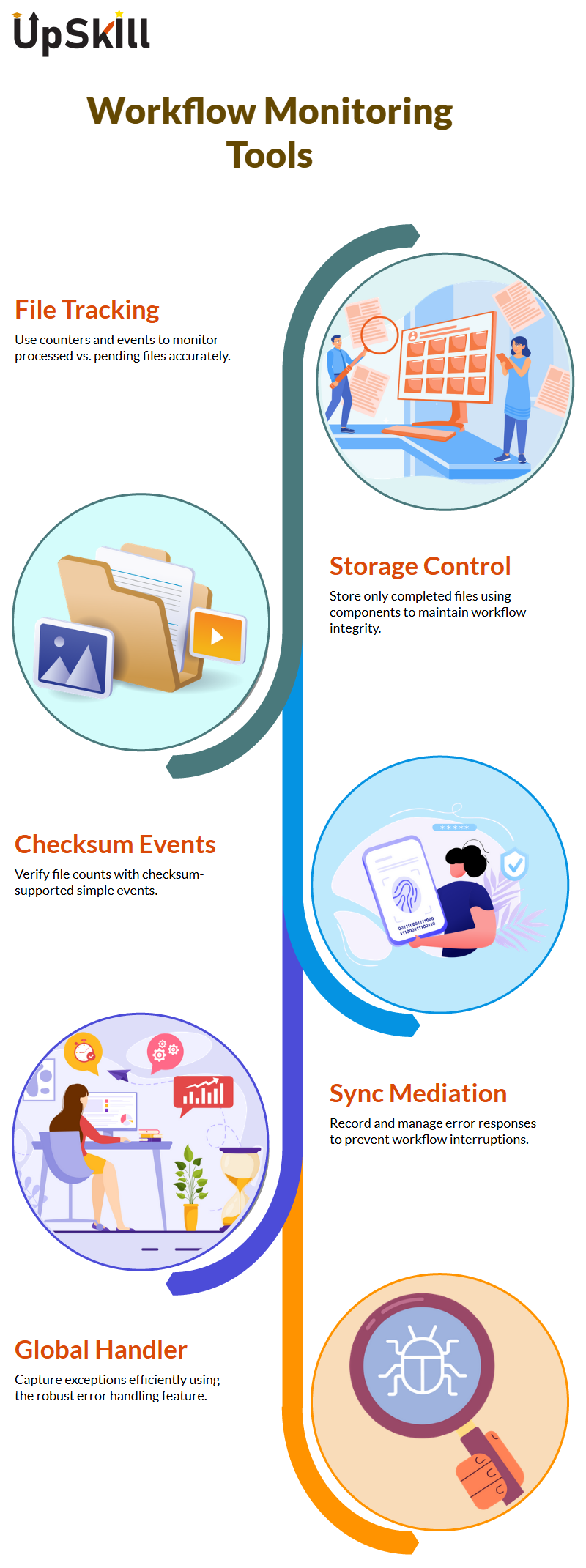
Mastering Workday Advanced Studio
Mastering Workday Advanced Studio’s capabilities for managing large datasets effectively is crucial when working with multiple pages of information.
Workday Advanced Studio streamlines this process by consolidating all information into a single XML file, simplifying complex data processing tasks.
Imagine receiving five pages of data, each containing 100 records. Instead of processing each document individually, Workday Advanced Studio enables the aggregation of all documents into a single, structured XML file for further logic implementation.
Workday Advanced Studio integrates page aggregation into its core functionality. By using XPath to define how data should be aggregated on each page, we ensure its proper compilation into one XML file while upholding integrity and organisation within our records.
Developers who attend the Workday Advanced Studio course in Bengaluru gain a strong foundation in customising parameter responses, giving data handling maximum flexibility.
If any particular parameter poses challenges or is unclear, please visit the help section for detailed guidance, ensuring your data processing remains both precise and efficient.
Workday Advanced Studio streamlines data handling by eliminating the need for separate splitters and aggregators, making the process seamless and efficient for processing large datasets or numerous records simultaneously. All pieces will be assembled appropriately using this powerful tool!
Optimising Performance in Workday Advanced Studio
Performance is of utmost importance when using Workday Advanced Studio. While seen mediation may help, its usage must be limited – typically only five to 10 per cent of time by developers.
Workday Advanced Studio’s dynamic routing mechanisms help increase processing efficiency.
Utilising machine learning expressions and routing components strategically, we can direct responses accurately while improving workflows and decreasing delays.
Practical Application of Workday Advanced Studio: Let’s put Workday Advanced Studio into practice by extracting data based on manager IDs when dealing with manager reports. Workday Advanced Studio then processes and stores this list for further examination.
Understanding Workday Advanced Studio’s logic is paramount. While its initial setup may appear complex, using routing components effectively ensures smooth execution.
By constantly fine-tuning processes through Workday Advanced Studio’s dynamic framework, operations become simpler over time.
For those eager to master these skills, the Workday Advanced Studio course in Bengaluru offers comprehensive guidance and hands-on experience.
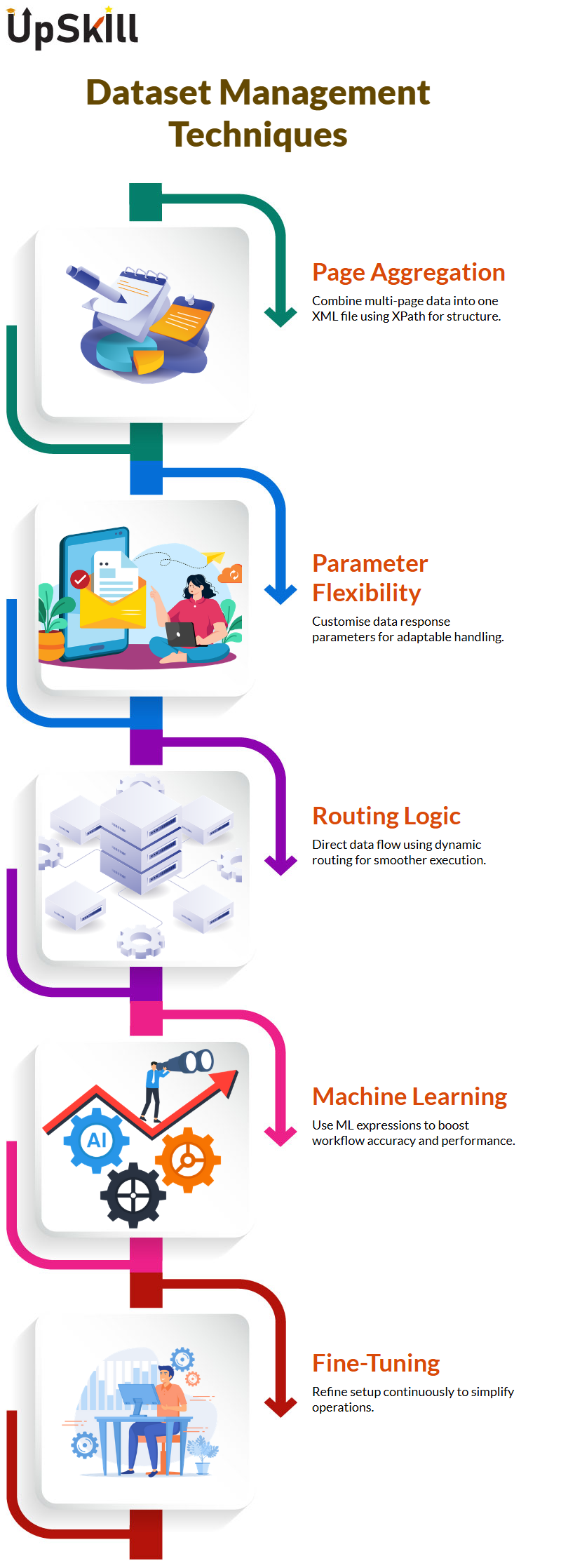
Mastering Workday Advanced Studio Filters
Let’s dive deep into Workday Advanced Studio today by exploring a vital reporting challenge–filtering employees according to their managers’ names.
As you crafted this report, you realised that a basic report wasn’t sufficient – you needed something with more filters that concentrated on managers while simultaneously ensuring that direct reports were structured appropriately.
Workday Advanced Studio enables the dynamic optimisation of reports. Instead of listing direct reports as workers, supervisors define the structure.
By performing this exercise, you will gain knowledge on how to split a single file into two by employing Workday Advanced Studio’s multi-instance processing capabilities.
First, run your report with manager filtering activated and view its expected results. For those seeking to enhance their skills further, the Workday Advanced Studio course in Bengaluru offers valuable practical insights and expert guidance.
Optimising Workday Advanced Studio for Report Structuring
A key point during the configuration of this report was creating a direct one-to-one mapping between employees and their supervisors—something Workday Advanced Studio excels at.
Adjust the report settings to customise data processing and achieve our objective: one row per employee instead of multiple instances for managers.
This methodology involves setting paths in Workday Advanced Studio so that hierarchical data flows appropriately, without looping direct reports back into their report structure.
You had to ensure direct reports weren’t looping back in (see “Splitting Data Efficiently in Workday Advanced Studio”).
Exploit Workday Advanced Studio to discover various techniques for efficiently splitting data, which is essential when overseeing multiple entries per manager.
Workday Advanced Studio now provides an alternate approach, enabling dynamic data segregation.
Multi-instance handling was an obstacle that presented multiple instances. Ensuring data integrity meant avoiding backtracking paths; to address this challenge, clearly outlined XPath routes proved essential in structuring the XML correctly.
Navigating Workday Advanced Studio’s substring logic was one of the key challenges when dealing with multi-instance reports and creating accurate splits; Workday Advanced Studio proved essential in this regard.
It simplifies work by allowing you to efficiently segment data using colon separation and test various structures until you determine the most efficient means of extracting entries.
While working through this issue, also explored multiple loop structures and segmentation methodologies to enhance report clarity.
For professionals seeking in-depth expertise, the Workday Advanced Studio course in Bengaluru provides practical knowledge to master these advanced techniques.
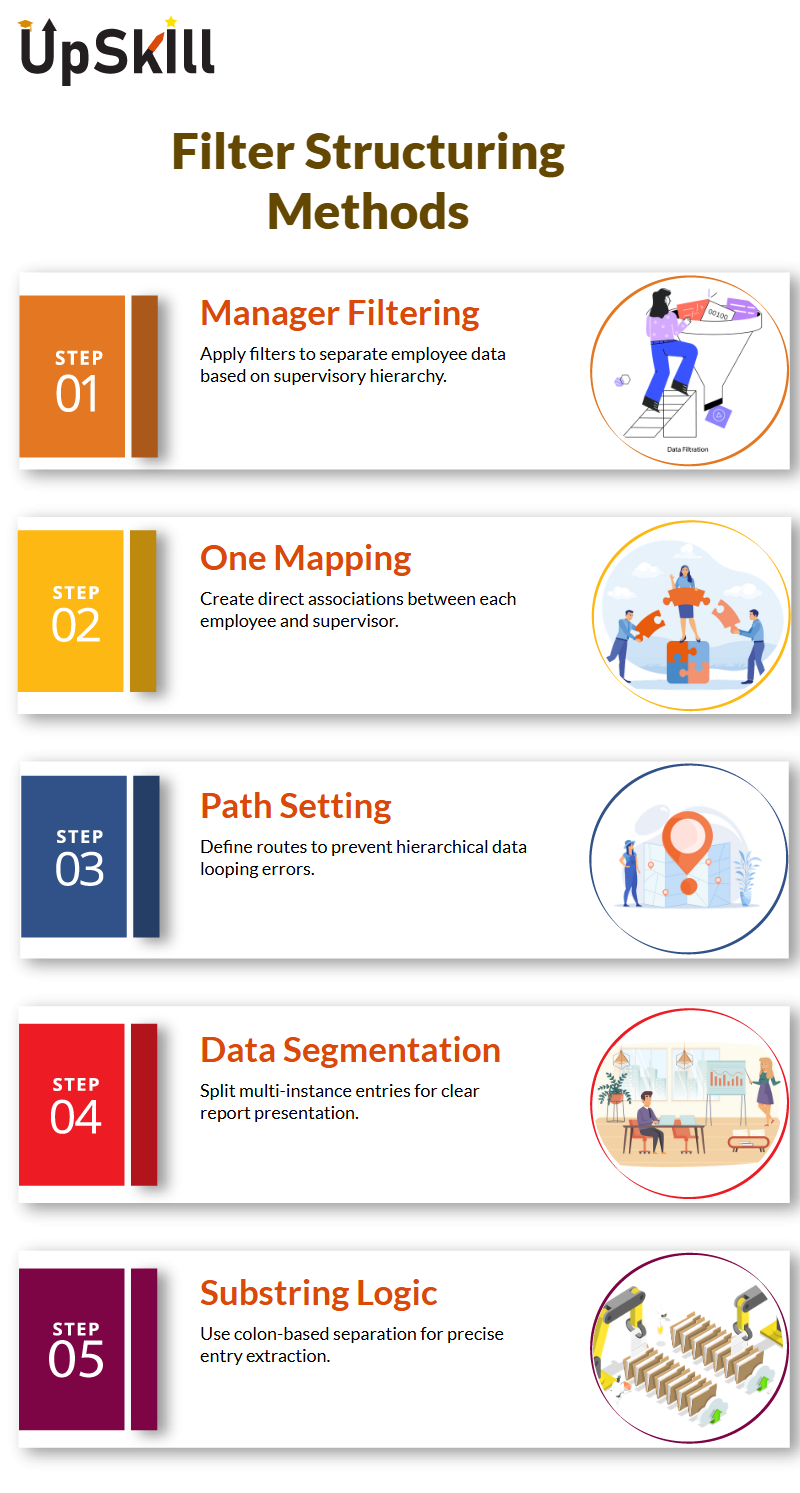
Launch Parameters in Workday Advanced Studio
In Workday Advanced Studio, launch parameters play a crucial role. When setting up requests and selecting organisations to determine worker details.
Workday Advanced Studio facilitates smooth interactions and data retrieval by incorporating launch parameters into web services, ensuring its seamless functioning and data retrieval capabilities.
Validating Data in Workday Advanced Studio
Validation in Workday Advanced Studio is crucial for preventing errors during request processing and ensuring data integrity.
For example, validating Workday IDs prevents empty responses while ensuring that only valid information is processed.
Page Handling in Workday Advanced Studio
Workday Advanced Studio offers various methods for handling pages within responses.
Choosing between single-page results or multi-page retrieval impacts the overall workflow process.
Workday Advanced Studio optimises processing when dealing with extensive datasets by making structured page requests and streamlining operations.
Optimise Requests in Workday Advanced Studio
Workday Advanced Studio helps increase efficiency by intelligently structuring requests.
From multipage documents to individual outputs, choosing an approach with care is essential for maximising performance.
Utilising Workday Advanced Studio ensures seamless interactions and enhanced output formatting during large-scale implementations.
For those seeking to develop expertise in managing these capabilities, the Workday Advanced Studio course in Bengaluru offers hands-on experience and practical guidance.
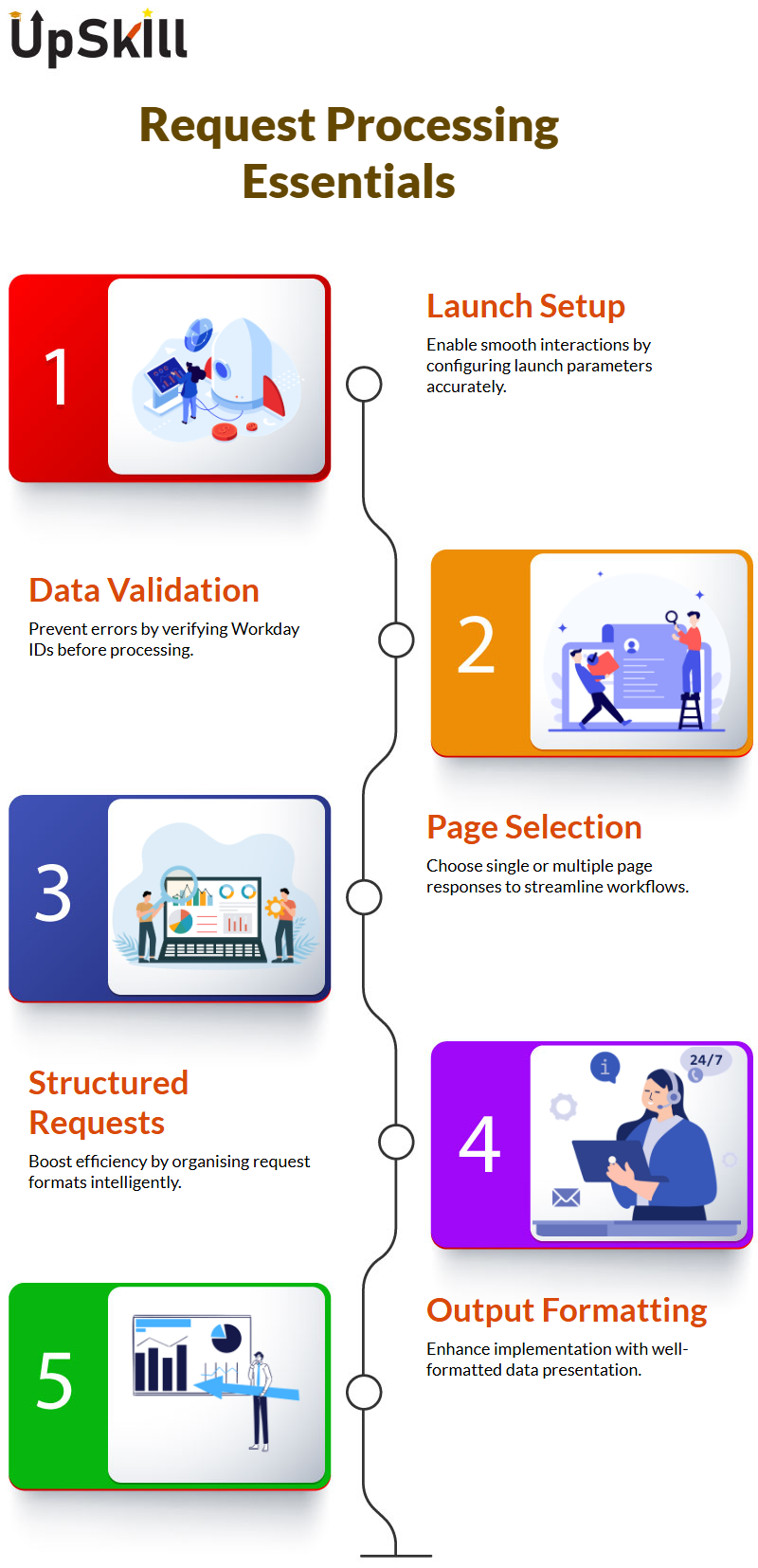
Optimising Data Processing with Workday Advanced Studio
Workday Advanced Studio streamlines data transformation by utilising XML transformations to structure raw information into structured formats, making it ready for further use.
By leveraging its benefits for data optimisation and processing efficiency, Workday Advanced Studio ensures that records are formatted accurately before use.
Workday Advanced Studio prioritises accessing data as a key requirement and relies heavily on it to process multiple records efficiently.
We employ specific techniques, like loops, to iterate through datasets effectively—this reduces redundant processes while speeding up execution.
Professionals who have completed the Workday Advanced Studio course in Bengaluru often apply advanced techniques like these with confidence, particularly in scenarios involving high-volume processing.
Workday Advanced Studio adheres to a fundamental practice when processing raw data: converting it to XML before applying logic, ensuring uniform processing across web services.
It also helps us streamline large-scale data handling operations. When processing thousands of records efficiently, memory usage must be efficiently managed; techniques like indentation control provide smooth processing without excessive resource use.
Since the release of Workday Advanced Studio 2.0, the evolution to version 3.0 has been rapid. Switching will seem utterly foreign to those familiar with 2.0; official documentation and community discussions often don’t provide sufficient details about 3.0.
Workday Advanced Studio requires gaining an in-depth knowledge of 2.0 first. Once this foundation is laid, understanding 3.0 should become simpler, but creating processes from scratch in 3.0 can still present some difficulty.
Workday Advanced Studio's Streaming Mode
Workday Advanced Studio employs an efficient burst-mode streaming approach for memory processing.
Rather than devouring an XML file all at once, elements are processed incrementally for improved accessibility.
Accumulators play a crucial role in Workday Advanced Studio 3.0. These tools navigate XML structures to produce aggregate results; therefore, understanding accumulators is vital when using WAS 3.0.
Those attending the Workday Advanced Studio course in Bengaluru often gain hands-on experience with streaming and accumulator use, preparing them to efficiently handle complex data workflows.
Optimising Workday Advanced Studio for Performance
We utilise Workday Advanced Studio to iterate through worker records efficiently, processing each one individually without loading an XML file into memory.
Instead, this application systematically executes records sequentially until completion. This iteration strategy enhances both performance and accessibility.
While its logic remains unchanged, whether working on version 2.0 or 3.0, its syntax differs significantly.
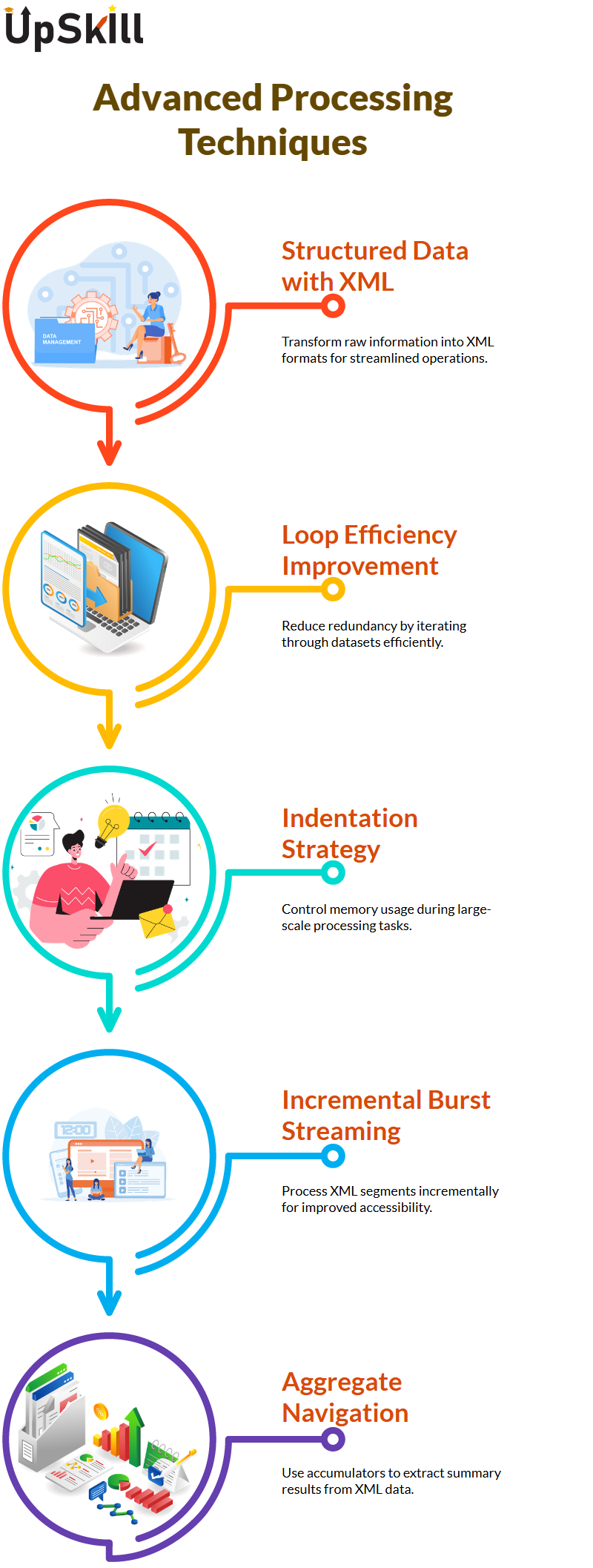
Workday Advanced Studio's Parameters and Conditions
Establishing parameters is central to structuring workflows within Workday Advanced Studio, optimising accessibility by utilising initial values and conditions as initial values or conditions to facilitate efficient automation processes.

